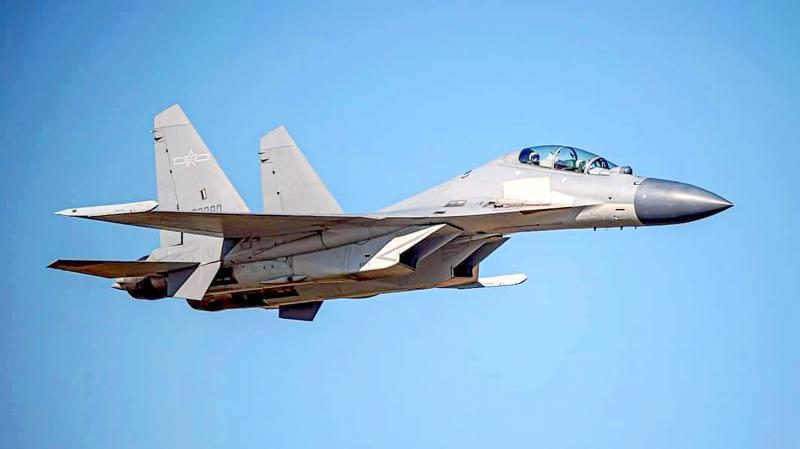Premier Su Tseng-chang (蘇貞昌) yesterday criticized China after 38 of its military aircraft crossed into Taiwan’s air defense identification zone (ADIZ) on Friday, the most in a single day since Taiwan began issuing a tally on such incursions in September last year.
On Friday evening, the Ministry of National Defense reported that 25 Chinese planes had crossed into the nation’s southeastern ADIZ, between Taiwan proper and the Pratas Islands (Dongsha Island, 東沙群島).
It identified the planes as 18 J-16 fighter jets, four SU-30 fighters, two H-6 bombers and one Y-8 anti-submarine warfare plane.

Photo courtesy of the Ministry of National Defense
Late on Friday night, the ministry reported that 13 Chinese aircraft had entered the southwestern ADIZ, identifying them as 10 J-16 fighter jets, two H-6 bombers and one KJ-500, which is a third-generation airborne early warning and control aircraft.
The J-16 fighters and the H-6 bombers entered the ADIZ from the direction of China’s Fujian and Guangdong provinces, crossed the Bashi Channel and returned to China, while the KJ-500 entered the ADIZ from the direction of Guangdong, before returning to China, ministry data showed.
The incursions came on the 72nd anniversary of the founding of the People’s Republic of China.
In response, Taiwan’s air force scrambled planes to monitor the Chinese aircraft, issued radio warnings and mobilized air defense assets, the ministry said.
Before Friday’s incursion, the most Chinese military planes to enter the ADIZ in a single day was 28 on June 15, two days after the G7 issued a statement highlighting the importance of peace and stability in the Taiwan Strait.
Later yesterday, the ministry said that another 20 Chinese air force planes had crossed into the ADIZ.
“China has been wantonly engaging in military aggression, damaging regional peace,” Su said.
China has used a wide range of bullying tactics against Taiwan, but the actions have increasingly been renounced by other countries, Su said.
Shu Hsiao-huang (舒孝煌), a research fellow at the Institute for National Defense and Security Research, said that the J-16 is the main fighter jet of China’s air force, and mobilizing 16 of them was perhaps aimed at familiarizing its pilots with the air space around Taiwan.
It could be a training exercise to acclimatize pilots to long-range flights, as well as coordinating with bombers, he added.
Taiwan should boost defenses in its southwestern air space, he said, adding that improving its intelligence gathering capabilities in the area could give the military more time to deploy mobile anti-air missile trucks on the east coast.
Retired air force deputy commander lieutenant general Chang Yen-ting (張延廷) said previous assumptions that Taiwan’s east coast is relatively safe are no longer true.
The route taken by the Chinese planes demonstrates that the whole of Taiwan is now within bombing range of its air force, and Taiwan’s military should begin establishing hardened aircraft shelters, Chang said.
Additional reporting by Wu Su-wei and Reuters

MORE VISITORS: The Tourism Administration said that it is seeing positive prospects in its efforts to expand the tourism market in North America and Europe Taiwan has been ranked as the cheapest place in the world to travel to this year, based on a list recommended by NerdWallet. The San Francisco-based personal finance company said that Taiwan topped the list of 16 nations it chose for budget travelers because US tourists do not need visas and travelers can easily have a good meal for less than US$10. A bus ride in Taipei costs just under US$0.50, while subway rides start at US$0.60, the firm said, adding that public transportation in Taiwan is easy to navigate. The firm also called Taiwan a “food lover’s paradise,” citing inexpensive breakfast stalls

TRADE: A mandatory declaration of origin for manufactured goods bound for the US is to take effect on May 7 to block China from exploiting Taiwan’s trade channels All products manufactured in Taiwan and exported to the US must include a signed declaration of origin starting on May 7, the Bureau of Foreign Trade announced yesterday. US President Donald Trump on April 2 imposed a 32 percent tariff on imports from Taiwan, but one week later announced a 90-day pause on its implementation. However, a universal 10 percent tariff was immediately applied to most imports from around the world. On April 12, the Trump administration further exempted computers, smartphones and semiconductors from the new tariffs. In response, President William Lai’s (賴清德) administration has introduced a series of countermeasures to support affected

CROSS-STRAIT: The vast majority of Taiwanese support maintaining the ‘status quo,’ while concern is rising about Beijing’s influence operations More than eight out of 10 Taiwanese reject Beijing’s “one country, two systems” framework for cross-strait relations, according to a survey released by the Mainland Affairs Council (MAC) on Thursday. The MAC’s latest quarterly survey found that 84.4 percent of respondents opposed Beijing’s “one country, two systems” formula for handling cross-strait relations — a figure consistent with past polling. Over the past three years, opposition to the framework has remained high, ranging from a low of 83.6 percent in April 2023 to a peak of 89.6 percent in April last year. In the most recent poll, 82.5 percent also rejected China’s

PLUGGING HOLES: The amendments would bring the legislation in line with systems found in other countries such as Japan and the US, Legislator Chen Kuan-ting said Democratic Progressive Party (DPP) Legislator Chen Kuan-ting (陳冠廷) has proposed amending national security legislation amid a spate of espionage cases. Potential gaps in security vetting procedures for personnel with access to sensitive information prompted him to propose the amendments, which would introduce changes to Article 14 of the Classified National Security Information Protection Act (國家機密保護法), Chen said yesterday. The proposal, which aims to enhance interagency vetting procedures and reduce the risk of classified information leaks, would establish a comprehensive security clearance system in Taiwan, he said. The amendment would require character and loyalty checks for civil servants and intelligence personnel prior to